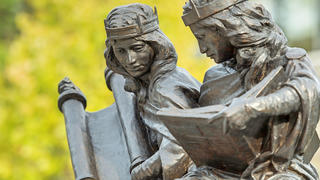First-of-its-kind Survey Reveals American Catholics’ Attitudes Toward Jews Have Improved in Last Century
A new study by Saint Joseph’s University’s Institute for Jewish-Catholic Relations dives into how American Catholics feel about Jews, Judaism and the Israeli-Palestinian conflict.
 The bronze sculpture "Synagoga and Ecclesia in Our Time" by Joshua Koffman commemorates the 50th anniversary of Nostra Aetate, the Vatican II document that transformed the relationship between the Catholic and Jewish faiths.
The bronze sculpture "Synagoga and Ecclesia in Our Time" by Joshua Koffman commemorates the 50th anniversary of Nostra Aetate, the Vatican II document that transformed the relationship between the Catholic and Jewish faiths.
A new study by Saint Joseph’s University’s Institute for Jewish-Catholic Relations (IJCR) unveils unprecedented data on American Catholics’ attitudes toward Jews, Judaism and the Israeli-Palestinian conflict. The poll concluded that after centuries of Catholics teaching contempt for Jews, American Catholics’ attitudes toward Jews have improved greatly since the Second Vatican Council ended in 1965.
Philip Cunningham, PhD, professor of theology, and Adam Gregerman, PhD, professor of theology, who serve as co-directors of the IJCR, spearheaded the poll conducted by SurveyUSA in July 2022. The subsequent results were revealed during a panel discussion on March 22, 2023. In total, 1,241 Catholics across the nation were asked for their opinions on a variety of topics.
Of the American Catholics polled, 89.4% describe their opinion toward Jews as “very good,” “good” or “neutral.”
Their positive attitudes are significantly generated by the fact that many American Catholics have Jewish friends, neighbors or coworkers.
Adam Gregerman, PhD
Professor of theology, co-director of the IJCRWhile Catholics’ opinions of Jews are positive, the same cannot be said nationwide. Data collected last year by the Anti-Defamation League (ADL) show that antisemitic acts are on the rise nationally. Since 1979, ADL has published an annual audit of antisemitic incidents. In 2022, ADL tabulated a record 3,697 antisemitic incidents throughout the United States. ADL says this is the third time in the past five years that the year-end total has been the highest number ever recorded.
During the Second Vatican Council from 1962 to 1965, bishops debated, amended, voted on, and eventually approved and published 16 documents covering a wide variety of topics. In Nostra Aetate, a declaration on non-Christian religions, Saint Pope Paul VI affirmed the Council’s desire to condemn antisemitism and any Catholic teaching that might encourage antisemitism.
According to Cunningham, before the Second Vatican Council, many Catholics believed Jews were under a divine curse or no longer had a covenantal relationship with God because they were thought to be guilty of the crucifixion of Jesus.
Eleven percent of American Catholics polled say Jews are to blame for the crucifixion of Jesus, while 13.3% say Jews are “cursed by God” or “used to be Chosen People.” Lastly, 15.8% say God’s covenant with Jewish people “has ended” or “never was intact.”
“We did not find the level of anti-Jewish ideas that were prevalent before the Second Vatican Council,” says Gregerman.
While Cunningham explains there has been significant progress in regard to antisemitism, he says there is still work to be done. The survey portrays how post-conciliar teaching about Jews has not been fully communicated to American Catholics.
Only 38.5% of American Catholics polled are “moderately” or “very familiar” with Catholic Church teachings about Jews. Cunningham is hoping this survey helps change that.
Additionally, less than 50% of those surveyed knew that the Catholic Church now recognizes, as doctrine, that the covenantal relationship between God and the Jewish people “brings forth treasures of wisdom” for Jews, as Pope Francis has expressed it. Cunningham and Gregerman agree that this is a pivotal post-conciliar teaching that needs to be highlighted in Catholic preaching and teaching.
“We think a quote from a 1985 Vatican document that says education about Jews cannot be marginal or peripheral is extremely important. It has to be central,” says Cunningham. “We really haven’t made education about Jews and Judaism central despite the goal that the Church set for itself.”
Gregerman agrees with Cunningham that there is still room for progress. However, he is optimistic.
“Our message is that the Church has done an amazing amount of good, especially coming from a very different position of hostility [toward Jews],” says Gregerman. “The Church should continue to be an agent of positive change.”
The survey also revealed American Catholics’ views toward the Israeli-Palestinian conflict. This decades-long conflict is rooted in competing claims to the Holy Land and includes disputes over borders, Jerusalem, security and Palestinian refugees.
According to the survey, 34.8% of American Catholics support Israel and 11.4% support Palestine. Most adopted a moderate position, expressing equal support for both sides.
Ultimately, both Cunningham and Gregerman were not surprised at how U.S. Catholics responded to the survey questions.
“I don’t think any of us saw numbers that totally shocked us,” says Gregerman. “I don’t think anything came back where we would not have expected it to be.”
